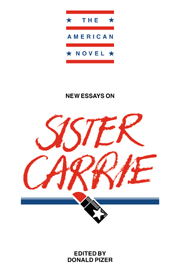Book contents
- Frontmatter
- Contents
- Series Editor's Preface
- Note on the Text
- 1 Introduction
- 2 Carrie's Blues
- 3 A Portrait of the Artist as a Young Actress: The Rewards of Representation in Sister Carrie
- 4 Sister Carrie: The City, the Self, and the Modes of Narrative Discourse
- 5 Who Narrates? Dreiser's Presence in Sister Carrie
- Notes on Contributors
- Selected Bibliography
1 - Introduction
Published online by Cambridge University Press: 05 June 2012
- Frontmatter
- Contents
- Series Editor's Preface
- Note on the Text
- 1 Introduction
- 2 Carrie's Blues
- 3 A Portrait of the Artist as a Young Actress: The Rewards of Representation in Sister Carrie
- 4 Sister Carrie: The City, the Self, and the Modes of Narrative Discourse
- 5 Who Narrates? Dreiser's Presence in Sister Carrie
- Notes on Contributors
- Selected Bibliography
Summary
SISTER CARRIE, like Madame Bovary and The Waste Land, is both a major work of art and an important landmark in the development of literary modernism. A distinctive characteristic of works of this kind is their centrality in efforts to define the nature of modern thought and expression. Almost always controversial and even held in contempt at their appearance, such works have continued to stimulate critical anxiety right up to the present. What is the new sensibility here expressed, it is asked, and how can our understanding of this sensibility aid our understanding of the intellectual and cultural space we continue to occupy? Unlike Flaubert's masterpiece of irony and Eliot's great symbolic poem, Sister Carrie also raises important questions about the very nature of significant art. How can a novel seemingly so unconsciously shaped and so inept in its devices and language hold generation after generation of sophisticated readers? It is at the complex intersection of these two lines of inquiry – Sister Carrie as a novel which achieves its penetrating insight into our lives almost in spite of itself – that much criticism of the work has both flourished and floundered.
Theodore Dreiser's life and career from his birth in 1870 to the appearance of Sister Carrie in 1900 are intimately related both to the depth and to the awkwardness of the novel. Dreiser's father was a German Catholic immigrant, his mother of Pennsylvania Mennonite farm background, and the family large and poor.
- Type
- Chapter
- Information
- New Essays on Sister Carrie , pp. 1 - 22Publisher: Cambridge University PressPrint publication year: 1991

